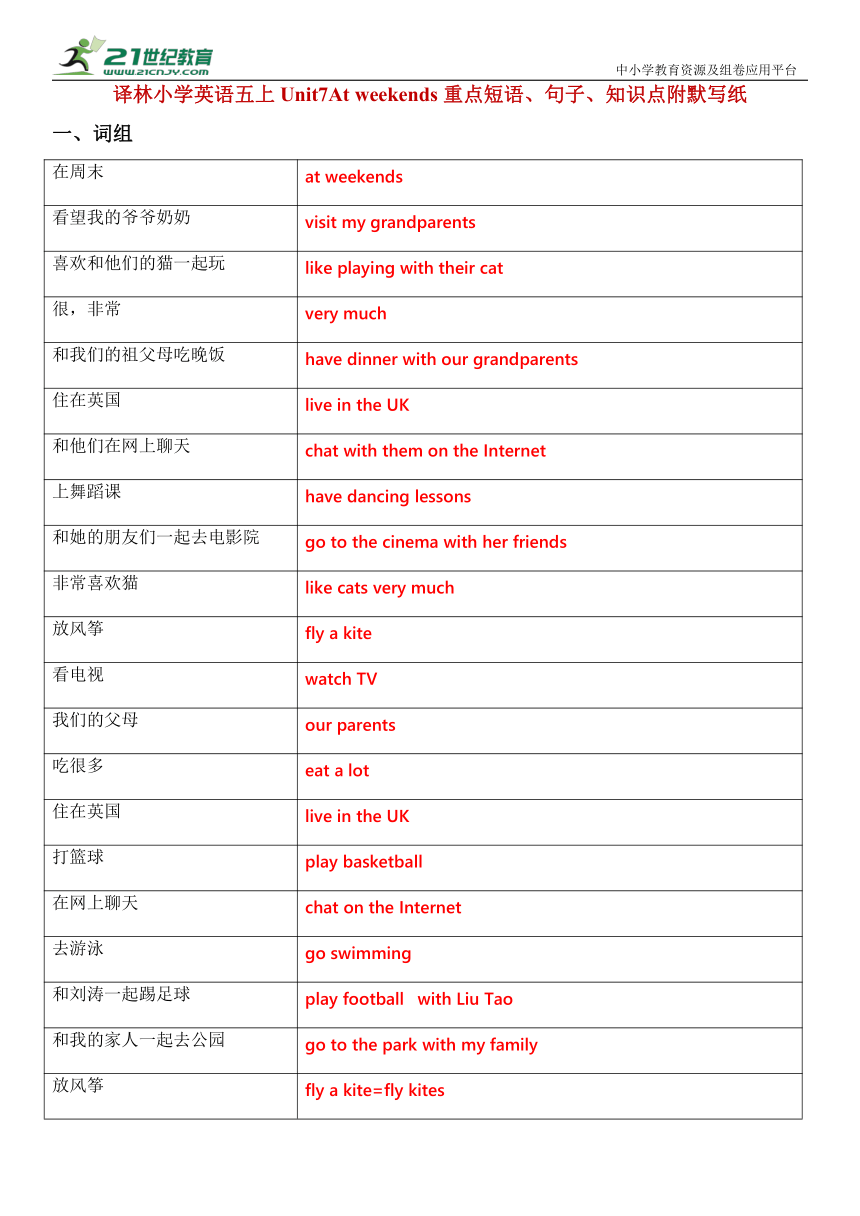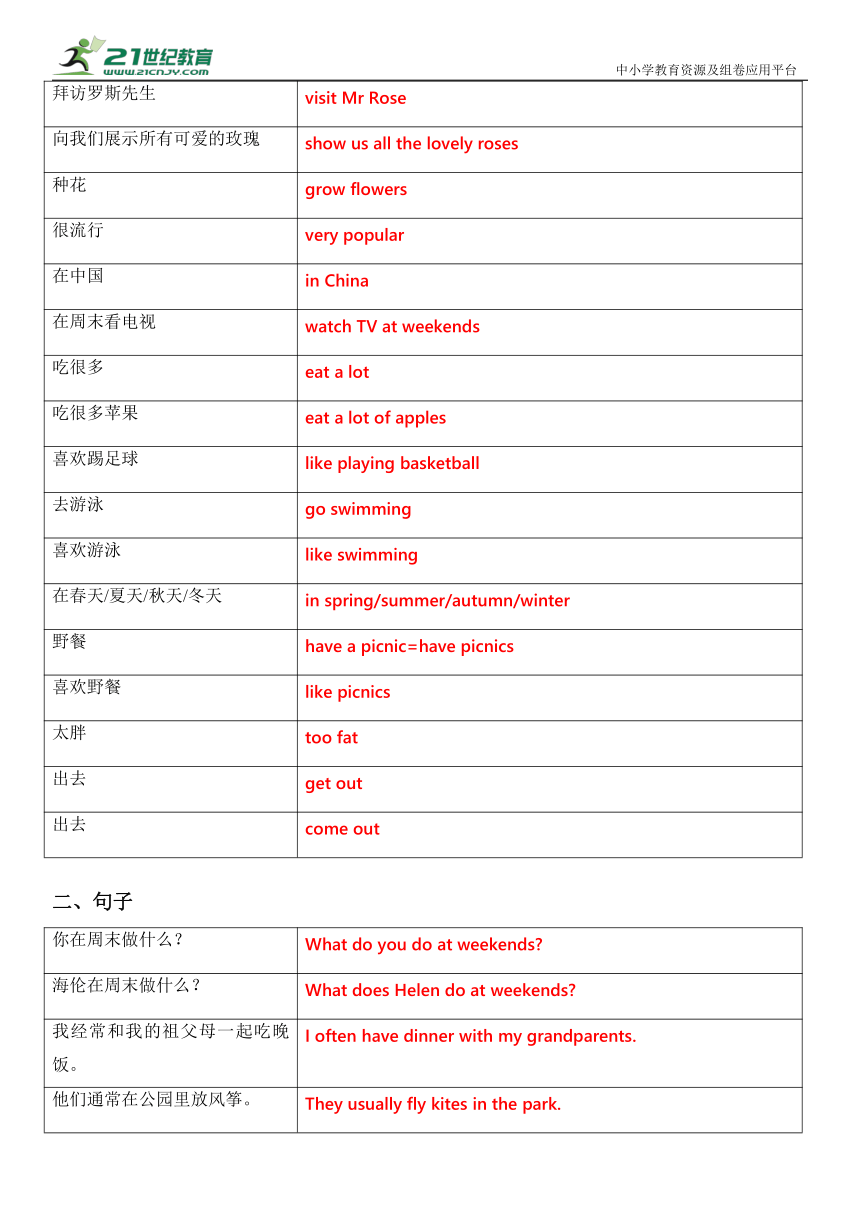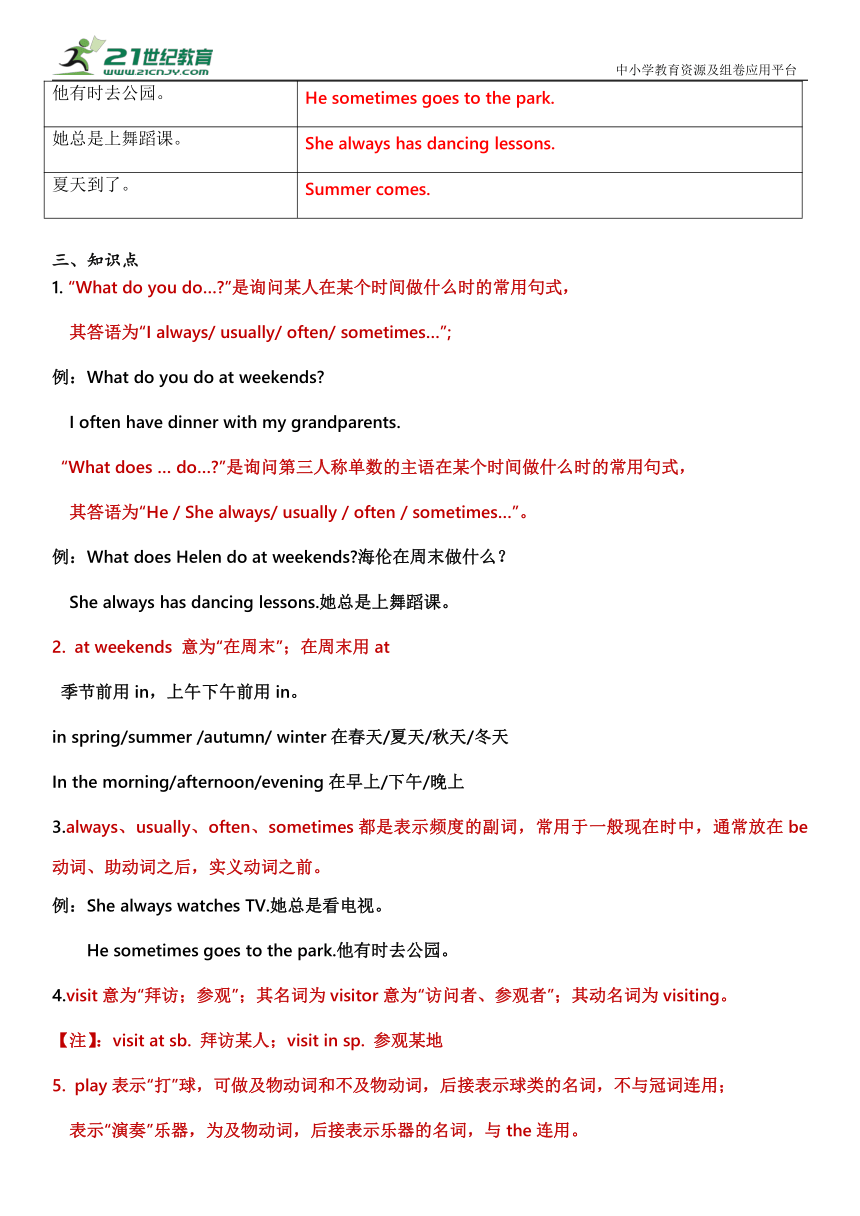Unit7 At weekends 知识点总结+默写练习(无答案)
文档属性
| 名称 | Unit7 At weekends 知识点总结+默写练习(无答案) |

|
|
| 格式 | docx | ||
| 文件大小 | 140.3KB | ||
| 资源类型 | 试卷 | ||
| 版本资源 | 牛津译林版 | ||
| 科目 | 英语 | ||
| 更新时间 | 2022-11-14 14:52:46 | ||
图片预览



文档简介
中小学教育资源及组卷应用平台
译林小学英语五上Unit7At weekends重点短语、句子、知识点附默写纸
一、词组
在周末 at weekends
看望我的爷爷奶奶 visit my grandparents
喜欢和他们的猫一起玩 like playing with their cat
很,非常 very much
和我们的祖父母吃晚饭 have dinner with our grandparents
住在英国 live in the UK
和他们在网上聊天 chat with them on the Internet
上舞蹈课 have dancing lessons
和她的朋友们一起去电影院 go to the cinema with her friends
非常喜欢猫 like cats very much
放风筝 fly a kite
看电视 watch TV
我们的父母 our parents
吃很多 eat a lot
住在英国 live in the UK
打篮球 play basketball
在网上聊天 chat on the Internet
去游泳 go swimming
和刘涛一起踢足球 play football with Liu Tao
和我的家人一起去公园 go to the park with my family
放风筝 fly a kite=fly kites
拜访罗斯先生 visit Mr Rose
向我们展示所有可爱的玫瑰 show us all the lovely roses
种花 grow flowers
很流行 very popular
在中国 in China
在周末看电视 watch TV at weekends
吃很多 eat a lot
吃很多苹果 eat a lot of apples
喜欢踢足球 like playing basketball
去游泳 go swimming
喜欢游泳 like swimming
在春天/夏天/秋天/冬天 in spring/summer/autumn/winter
野餐 have a picnic=have picnics
喜欢野餐 like picnics
太胖 too fat
出去 get out
出去 come out
二、句子
你在周末做什么? What do you do at weekends
海伦在周末做什么? What does Helen do at weekends
我经常和我的祖父母一起吃晚饭。 I often have dinner with my grandparents.
他们通常在公园里放风筝。 They usually fly kites in the park.
他有时去公园。 He sometimes goes to the park.
她总是上舞蹈课。 She always has dancing lessons.
夏天到了。 Summer comes.
三、知识点
1. “What do you do… ”是询问某人在某个时间做什么时的常用句式,
其答语为“I always/ usually/ often/ sometimes…”;
例:What do you do at weekends
I often have dinner with my grandparents.
“What does … do… ”是询问第三人称单数的主语在某个时间做什么时的常用句式,
其答语为“He / She always/ usually / often / sometimes…”。
例:What does Helen do at weekends 海伦在周末做什么?
She always has dancing lessons.她总是上舞蹈课。
at weekends 意为“在周末”;在周末用at
季节前用in,上午下午前用in。
in spring/summer /autumn/ winter在春天/夏天/秋天/冬天
In the morning/afternoon/evening在早上/下午/晚上
3.always、usually、often、sometimes都是表示频度的副词,常用于一般现在时中,通常放在be动词、助动词之后,实义动词之前。
例:She always watches TV.她总是看电视。
He sometimes goes to the park.他有时去公园。
4.visit意为“拜访;参观”;其名词为visitor意为“访问者、参观者”;其动名词为visiting。
【注】:visit at sb. 拜访某人;visit in sp. 参观某地
play表示“打”球,可做及物动词和不及物动词,后接表示球类的名词,不与冠词连用;
表示“演奏”乐器,为及物动词,后接表示乐器的名词,与the连用。
例:I like playing football.我喜欢踢足球。
He likes playing the piano.他喜欢弹钢琴。
6.dancing lesson意为“舞蹈课”
【拓展】:swimming lesson 游泳课;skating lesson 溜冰课
7.eat a lot 吃许多
a lot 意为“很多”,修饰动词用a lot
如后接名词其短语为a lot of = lots of 意为“许多”,用来修饰可数名词或者不可数名词。
There are a lot of apples on the table. 桌子上有很多苹果。
8. Summer comes. 夏天来了。
动词come在这里用的三单形式,而summer做一个整体看待。一般情况下,不可数名词或者可数名词单数做主语时,需要用动词的第三人称单数形式。
9.go swimming 意为“去游泳”。通常情况下,go + doing表示进行某项运动。
go fishing 去钓鱼;go skating 去滑冰;go climbing 去爬山…
默写纸
一、词组
在周末
看望我的爷爷奶奶
喜欢和他们的猫一起玩
很,非常
和我们的祖父母吃晚饭
住在英国
和他们在网上聊天
上舞蹈课
和她的朋友们一起去电影院
非常喜欢猫
放风筝
看电视
我们的父母
吃很多
住在英国
打篮球
在网上聊天
去游泳
和刘涛一起踢足球
和我的家人一起去公园
放风筝
拜访罗斯先生
向我们展示所有可爱的玫瑰
种花
很流行
在中国
在周末看电视
吃很多
吃很多苹果
喜欢踢足球
去游泳
喜欢游泳
在春天/夏天/秋天/冬天
野餐
喜欢野餐
太胖
出去
出去
二、句子
你在周末做什么?
海伦在周末做什么?
我经常和我的祖父母一起吃晚饭。
他们通常在公园里放风筝。
他有时去公园。
她总是上舞蹈课。
夏天到了。
译林小学英语五上Unit7At weekends重点短语、句子、知识点附默写纸
一、词组
在周末 at weekends
看望我的爷爷奶奶 visit my grandparents
喜欢和他们的猫一起玩 like playing with their cat
很,非常 very much
和我们的祖父母吃晚饭 have dinner with our grandparents
住在英国 live in the UK
和他们在网上聊天 chat with them on the Internet
上舞蹈课 have dancing lessons
和她的朋友们一起去电影院 go to the cinema with her friends
非常喜欢猫 like cats very much
放风筝 fly a kite
看电视 watch TV
我们的父母 our parents
吃很多 eat a lot
住在英国 live in the UK
打篮球 play basketball
在网上聊天 chat on the Internet
去游泳 go swimming
和刘涛一起踢足球 play football with Liu Tao
和我的家人一起去公园 go to the park with my family
放风筝 fly a kite=fly kites
拜访罗斯先生 visit Mr Rose
向我们展示所有可爱的玫瑰 show us all the lovely roses
种花 grow flowers
很流行 very popular
在中国 in China
在周末看电视 watch TV at weekends
吃很多 eat a lot
吃很多苹果 eat a lot of apples
喜欢踢足球 like playing basketball
去游泳 go swimming
喜欢游泳 like swimming
在春天/夏天/秋天/冬天 in spring/summer/autumn/winter
野餐 have a picnic=have picnics
喜欢野餐 like picnics
太胖 too fat
出去 get out
出去 come out
二、句子
你在周末做什么? What do you do at weekends
海伦在周末做什么? What does Helen do at weekends
我经常和我的祖父母一起吃晚饭。 I often have dinner with my grandparents.
他们通常在公园里放风筝。 They usually fly kites in the park.
他有时去公园。 He sometimes goes to the park.
她总是上舞蹈课。 She always has dancing lessons.
夏天到了。 Summer comes.
三、知识点
1. “What do you do… ”是询问某人在某个时间做什么时的常用句式,
其答语为“I always/ usually/ often/ sometimes…”;
例:What do you do at weekends
I often have dinner with my grandparents.
“What does … do… ”是询问第三人称单数的主语在某个时间做什么时的常用句式,
其答语为“He / She always/ usually / often / sometimes…”。
例:What does Helen do at weekends 海伦在周末做什么?
She always has dancing lessons.她总是上舞蹈课。
at weekends 意为“在周末”;在周末用at
季节前用in,上午下午前用in。
in spring/summer /autumn/ winter在春天/夏天/秋天/冬天
In the morning/afternoon/evening在早上/下午/晚上
3.always、usually、often、sometimes都是表示频度的副词,常用于一般现在时中,通常放在be动词、助动词之后,实义动词之前。
例:She always watches TV.她总是看电视。
He sometimes goes to the park.他有时去公园。
4.visit意为“拜访;参观”;其名词为visitor意为“访问者、参观者”;其动名词为visiting。
【注】:visit at sb. 拜访某人;visit in sp. 参观某地
play表示“打”球,可做及物动词和不及物动词,后接表示球类的名词,不与冠词连用;
表示“演奏”乐器,为及物动词,后接表示乐器的名词,与the连用。
例:I like playing football.我喜欢踢足球。
He likes playing the piano.他喜欢弹钢琴。
6.dancing lesson意为“舞蹈课”
【拓展】:swimming lesson 游泳课;skating lesson 溜冰课
7.eat a lot 吃许多
a lot 意为“很多”,修饰动词用a lot
如后接名词其短语为a lot of = lots of 意为“许多”,用来修饰可数名词或者不可数名词。
There are a lot of apples on the table. 桌子上有很多苹果。
8. Summer comes. 夏天来了。
动词come在这里用的三单形式,而summer做一个整体看待。一般情况下,不可数名词或者可数名词单数做主语时,需要用动词的第三人称单数形式。
9.go swimming 意为“去游泳”。通常情况下,go + doing表示进行某项运动。
go fishing 去钓鱼;go skating 去滑冰;go climbing 去爬山…
默写纸
一、词组
在周末
看望我的爷爷奶奶
喜欢和他们的猫一起玩
很,非常
和我们的祖父母吃晚饭
住在英国
和他们在网上聊天
上舞蹈课
和她的朋友们一起去电影院
非常喜欢猫
放风筝
看电视
我们的父母
吃很多
住在英国
打篮球
在网上聊天
去游泳
和刘涛一起踢足球
和我的家人一起去公园
放风筝
拜访罗斯先生
向我们展示所有可爱的玫瑰
种花
很流行
在中国
在周末看电视
吃很多
吃很多苹果
喜欢踢足球
去游泳
喜欢游泳
在春天/夏天/秋天/冬天
野餐
喜欢野餐
太胖
出去
出去
二、句子
你在周末做什么?
海伦在周末做什么?
我经常和我的祖父母一起吃晚饭。
他们通常在公园里放风筝。
他有时去公园。
她总是上舞蹈课。
夏天到了。
